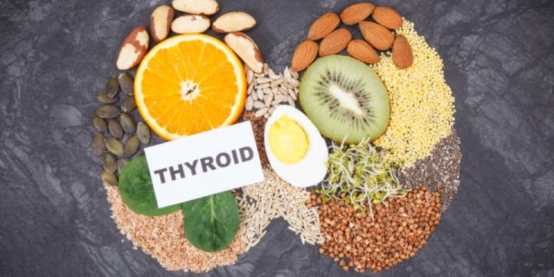How To Support Thyroid Health With Nutrition
The thyroid may be small, but it has a big job. This butterfly-shaped gland, located in the neck, produces hormones that regulate metabolism, energy, body weight, and even mood. When thyroid function is out of balance, everything from digestion to mental clarity can be affected.
Nutrition plays a vital role in supporting thyroid health. Specific nutrients directly fuel the gland's hormone production, while others help regulate immune function and prevent damage to thyroid tissue.
Understanding the Thyroid-Nutrition Connection
The thyroid produces two main hormones: thyroxine (T4) and triiodothyronine (T3). The brain regulates thyroid activity through thyroid-stimulating hormone (TSH). T4 must be converted into T3, the active hormone, by enzymes that rely on key minerals.

Nutrients do more than just “support” the thyroid—they enable hormone production, activation, and delivery to body tissues. Without them, the entire hormonal communication system falters.
Common thyroid disorders include:
Hypothyroidism: Underactive thyroid leading to fatigue, weight gain, and dry skin.
Hyperthyroidism: Overactive thyroid causing weight loss, rapid heartbeat, and anxiety.
Hashimoto’s thyroiditis: An autoimmune disorder where the immune system attacks thyroid tissue.
Graves’ disease: Autoimmune hyperthyroidism linked to excess hormone release.
Nutrition affects all of these conditions by shaping hormone balance, reducing inflammation, and improving energy metabolism.
Essential Nutrients for Thyroid Health
Iodine
Why it matters: Iodine is the raw material for thyroid hormone production. However, both deficiency and excess can disrupt thyroid balance.
Best sources: Seaweed, dairy, iodised salt, and eggs.
Selenium
Why it matters: Selenium helps enzymes convert T4 into active T3 and protects the gland from oxidative Stress.
Best sources: Brazil nuts, fish, poultry, and sunflower seeds.
Zinc
Why it matters: Zinc impacts TSH regulation and aids thyroid hormone synthesis.
Best sources: Oysters, beef, pumpkin seeds, and lentils.
Iron
Why it matters: Iron is crucial for thyroid peroxidase, an enzyme needed for hormone creation. Deficiency can mimic low thyroid symptoms.
Best sources: Red meat, spinach, beans, and fortified cereals.
Vitamin D
Why it matters: A modulator of the immune system, Vitamin D deficiency is strongly linked to Hashimoto’s.
Best sources: Sun exposure, fatty fish, fortified milk, and egg yolks.
B Vitamins
Why it matters: B12, in particular, supports metabolism, nerve health, and energy production.
Best sources: Meat, eggs, dairy, and fortified nutritional yeast.
Magnesium
Why it matters: Supports enzymatic reactions needed for thyroid hormone metabolism.
Best sources: Almonds, spinach, avocado, and beans.
Omega-3 Fatty Acids
Why it matters: Reduce inflammation tied to autoimmune thyroid conditions.
Best sources: Salmon, mackerel, walnuts, and flaxseed.
Best Foods to Eat for Thyroid Support
Seaweed: Rich in iodine, but should be eaten in moderation to avoid excess.
Brazil nuts: One to two can provide daily selenium.
Animal protein: Excellent source of iron, zinc, and B12.
Fatty fish: Provide omega-3s and Vitamin D.
Eggs: Contain protein, selenium, and iodine all in one.
Cruciferous vegetables: Broccoli and kale are fine when cooked and eaten moderately.
Berries and leafy greens: Provide antioxidants that protect thyroid cells.

Foods to Limit or Avoid
Highly processed foods: Promote inflammation and gut imbalance.
Excess soy: May interfere with the effectiveness of thyroid medications in large amounts.
Gluten: Strong association with Hashimoto’s and autoimmune activation.
Refined carbs and sugar contribute to insulin resistance, which worsens thyroid imbalance.
Raw cruciferous vegetables in excess: Can mildly affect iodine use, but are safe when cooked.
Meal Timing & Eating Habits
Eating at consistent intervals helps keep hormone metabolism steady. Extended fasting may Stress the thyroid in sensitive individuals, while hydration and balanced meals improve energy regulation.
Caffeine: Can interfere with thyroid medication absorption if taken too soon after dosing.
Alcohol: May impact hormone conversion and liver detoxification pathways.
Optimising Nutrient Absorption
Medication timing: Levothyroxine should be taken on an empty stomach, at least 30–60 minutes before food.
Supplements caution: Calcium, iron, and high-fibre foods may interfere with absorption. Space them several hours apart.
Better pairings: Combine iron-rich foods with Vitamin C (like spinach + citrus), and fat-soluble vitamins with healthy fats (Vitamin D + salmon).
Sample Thyroid-Supportive Meal Plan
Breakfast: Omelette with spinach, mushrooms, and eggs; paired with a side of berries.
Lunch: Grilled salmon with quinoa and roasted broccoli.
Snack: Greek yoghurt sprinkled with walnuts and chia seeds.
Dinner: Lean beef stir fry with bell peppers, zucchini, and garlic, served with brown rice.
Vegetarian swaps: Lentils, tofu, chickpeas, and nuts provide supportive nutrients when balanced carefully.
Lifestyle Factors Beyond Nutrition
Gut health: A healthy gut reduces autoimmune flare-ups and supports nutrient absorption.
Stress management: High cortisol levels can block thyroid hormone conversion.
Sleep quality: 7–9 hours per night helps regulate circadian rhythm and thyroid balance.
Movement: Gentle, consistent exercise supports metabolism and mood without overstressing the body.
When Nutrition Alone Isn’t Enough
Diet is powerful, but medical evaluation is essential for accurate thyroid management. Testing should include TSH, Free T4, Free T3, thyroid antibodies, Vitamin D, and ferritin. For many, nutrition complements—but does not replace—thyroid hormone replacement therapies.

According to the American Thyroid Association, appropriate medical treatment combined with balanced nutrition creates the best foundation for thyroid wellness. Patients with autoimmune thyroid conditions may also benefit from integrative care approaches supported by reputable health systems like Mayo Clinic. For nutrition evidence and guidelines, the National Institutes of Health provides in-depth scientific data on micronutrients.
Key Takeaways for Supporting Thyroid Health With Nutrition
Prioritise nutrient-dense whole foods such as fish, eggs, and Brazil nuts.
Avoid processed, sugary, or highly refined foods that worsen inflammation.
Balance eating habits while spacing out supplements and medication to maximise absorption.
Support thyroid health holistically with Stress management, good sleep, and appropriate testing.
Nutrition is a powerful ally for thyroid balance, but it works best as part of a comprehensive lifestyle supported by professional medical care.
Sources
Related Posts

5 Super Easy Muffin Pan Dessert Recipes

How To Support Thyroid Health With Nutrition

Top 8 Vegan Dinner Recipes For Healthy Eating

How To Support Liver Health With Detoxifying Foods

Vegan Chocolate Avocado Mousse: Creamy Without Dairy
